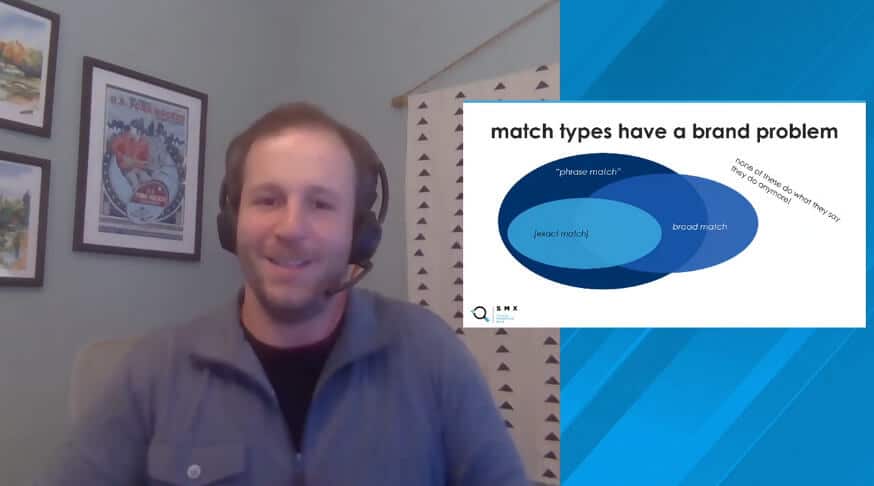“I believe we’ve gotten away from advertising and marketing over time, and a number of what is going on with match sorts empowers that,” mentioned Aaron Levy, head of paid search at Tinuiti, in his presentation at SMX Subsequent. “This enables us to develop our campaigns and companies by taking a look at an even bigger image as an alternative of wanting on the phrases that folks use.”
In accordance with Levy, key phrases are now not essentially the most related piece of paid search campaigns. Moderately than remaining the linchpin, they’re destined to play a way more tangential function in the way forward for advertising and marketing, particularly in relation to precise match methods.
“I do know that they’re [keywords] nonetheless in Google Adverts. I do know that they’re nonetheless in Bing Adverts,” he mentioned. “However essentially they’re gone. There is no such thing as a longer an space the place we’re going to choose the precise phrase that somebody goes to make use of.”
“We’ve been predicting this for years. We’ve anticipated them to go away,” he added.
Regardless of figuring out this transformation was inevitable, entrepreneurs should still be scrambling to craft new methods to focus on prospects based mostly on a extra broad understanding of queries. Happily, Levy laid out a roadmap to assist entrepreneurs regulate their key phrase matching methods.
Transitioning to new key phrase match sorts
Profitable paid search advertising and marketing was outlined largely by precision — the power of entrepreneurs to train management over their campaigns by way of precise and phrase key phrase matching. And whereas broad match was accessible, it was by no means as huge of a spotlight.
“I used single key phrase campaigns,” Levy mentioned. “I wished to have all the pieces in the identical place. I wished to maximise segmentation. I wished to regulate each single solitary factor in each message that each individual noticed.”
“To me, phrase match was a waste of time. It didn’t make any sense to me, so we solely used precise and broad match modified key phrases,” he added.

Levy famous that this give attention to precise match key phrases labored nicely again then; it was a technique many entrepreneurs used to get their advertisements in entrance of individuals extra effectively. Nonetheless, as Google’s algorithms change, advertising and marketing methods have to shift as nicely.
“We have to evolve,” he mentioned. “We have to transfer previous this language-only means of doing search.”
Focusing an excessive amount of on the precise language of queries prevents entrepreneurs from seeing the total context of their audiences. To handle this problem, Levy suggests entrepreneurs contemplate considering of their campaigns by way of passive (broad) and lively (precise) focusing on, inserting extra emphasis on the previous: “Lively is if you find yourself straight attempting to make one thing occur for a given phrase for a given individual. Passive, or broad match, is if you set a theme, let the ‘Google Roomba’ drive round and stumble upon some partitions and make some choices. Then you definitely see what occurs.”
There’ll all the time be conditions the place entrepreneurs should manually regulate their paid campaigns. However the important thing level is that they now not have to regulate all the pieces about their matching, and the earlier they let go of that management, the higher.
Viewers segmentation utilizing trendy match sorts
Segmentation has all the time been a key ingredient of profitable paid search campaigns. These practices assist entrepreneurs break down their audiences utilizing related knowledge resembling shopping for intent or demographics. However adjustments in digital promoting — particularly the transfer to responsive search advertisements — have modified the segmentation course of.
“Segmentation in trendy search with trendy match sorts is a little bit totally different,” mentioned Levy. “I’m not attempting to have an ideal one-to-one message match as a result of we now have responsive search advertisements. And I do know that every one of us are mourning the loss of life of expanded textual content advertisements, however the truth is all advertisements are responsive now.”

Trendy match sorts permit entrepreneurs to section their audiences based mostly on actionable knowledge as an alternative of losing time attempting to attain most segmentation. Leveraging broad matching helps entrepreneurs additional optimize RSAs by minimally segmenting audiences utilizing efficiency, objectives, budgets and different related knowledge.
“At this time limit we’re seeing that knowledge worth is more practical than it’s having excellent management and one-to-one message match,” mentioned Levy. ”We need to section campaigns and advert teams based mostly on what efficiency dictates, when budgets change, when objectives differ or when messaging must be totally different.”
How AI impacts phrase and broad match sorts
Final 12 months, Google introduced that phrase and broad key phrase match sorts are most well-liked after they’re similar to queries. That is little doubt resulting from its work with AI, particularly BERT, which has helped the search engine higher interpret language and intent.
Nonetheless, these AI programs are usually not on the keyword-matching degree many entrepreneurs count on them to be.
“What all of us need, and possibly what serps are promoting, is synthetic intelligence with matching habits that may replicate human thought,” mentioned Levy. “It would mimic the way in which that we work. It would perceive the issues that we perceive.”
Sadly, these programs fall wanting this aim.

But although Google’s AI programs fail to grasp and apply human habits to matching, entrepreneurs can nonetheless use them to enhance advert campaigns. They only want to consider them in another way.
“A greater means to think about match sorts, and a greater solution to predict their habits, is to think about them as machine studying,” mentioned Levy. “They don’t assume; they study. They perceive efficiency. They perceive statistical fashions. They work out what occurred and so they study and develop from it. We give it a conversion aim or a key phrase goal and it seeks to perform that aim as many occasions as potential, which implies it’s going to have some swings and misses.”
He added, “So, it’s a performance-based choice engine and it’s in search of relevance. And there’s a solution to predict it.”
Levy asks entrepreneurs to think about search algorithms as applied sciences in want of teaching, moderately than anticipating them to grasp searchers as an individual would. Entrepreneurs can assist these programs match extra successfully by:
- Utilizing key phrases instruments and search listening instruments to forecast matching.
- Limiting language focusing on to keep away from question confusion.
- Negating synonyms, slang and every other language that doesn’t work for people.
“For something that you just’ve discovered doesn’t work, arrange a guardrail and defend [the campaign] in opposition to the AI,” Levy mentioned. “That can assist mitigate a few of these dangerous matches, liberating you up to make use of match sorts for what they’re meant to do.”
Entrepreneurs that may deploy trendy matching in a responsive advert surroundings can have the best probability of succeeding in our remodeled paid search panorama.
Watch the total SMX Subsequent presentation right here (free registration required).
New on Search Engine Land







